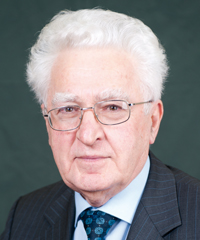| |
|
 |
|

|
|
Born March 8, 1939
Professor, Full Member of the Russian Academy of Sciences, Principal Adviser for Academic Affairs, Institute of Philosopy, Russian Academy of Science
Education
Philosophy, Faculty of Philosophy, Moscow Lomonosov State University, 1961.
Postgraduate studies, Philosophy, Faculty of Philosophy, Moscow Lomonosov State University, 1964.
|
Researcher ID: I-5974-2018
Scopus Author ID: 6507740279
РИНЦ SPIN: 4333-7699, Author ID: 72561
|
|
Degrees
|
|
- Dr. Sc., Philosophy, 1977, ("The Social Nature of Morality”)
- Cand. Sc. Philosophy [Ph.D.], Moscow State University, 1964 (“The Conditions of the Genesis of Morality”).
|
|
Titles
|
|
- Full Member of the Russian Academy of Sciences, 2003
- Corresponding Member of the Russian Academy of Sciences, 1997-2003
- Professor, 1982
- Laureate of the 1996 UNESCO Madanjeet Singh Prize for the Promotion of Tolerance and Non-Violence
- Laureate of the State Award of Russian Federation for “New Philosophical Encyclopedia” in 4 volumes. 2003
- Dr. h.c. of the St-Petersburg State University, Russia
- Prof. h.c. of Novgorod Yaroslavl the Wise State University, Russia
|
|
Professional
appointments
|
|
- Principal Adviser for Academic Affairs of the Institute of Philosopy, Russian Academy of Science: 2015 – present;
- Director of the Institute of Philosopy, Russian Academy of Science: 2006–2015;
- Deputy Director of the Institute of Philosopy, Russian Academy of Science: 1994–2005;
- Head, Department of Ethics, Faculty of Philosophy, Lomonosov Moscow State University: 1996–2014;
- Research fellow of the Institute of Philosopy, Russian Academy of Science: 1987 – present;
- Assistant professor, Lecturer, Professor of philosophy and ethics at the Lomonosov Moscow State University: 1967 – present.
|
|
Employment as visiting Professor
(selected list)
|
|
- 1996–2000 – Professor of Ethics, Novgorod Yaroslavl the Wise State University, Russia
- 1985–1986 – Professor of Ethics, Carlow University, Prague
- 1978–1980 – Professor of Ethics, Humboldt-University, Berlin
|
|
Teaching
Experience
|
|
- Ethics: Systematic Course for Students of Philosophy (Moscow Lomonosov State University)
- Ethics of Aristotle
- Free will and Responsibility
- Ancient Ethics
|
|
Professional
activities
|
|
- Editor-in-Chief, journal “Social Studies” (in English). Moscow, Russia
- Editor-in-Chief, journal “Ethical Thought”. Moscow, Russia (since 2000)
- Member, Editorial Board, journals: "The Questions of Philosophy", "Philosophical sciences". Moscow, Russia
- Editor-in-Chief, dictionary "Ethics”. Moscow, Russia
- Member, Editorial Board, “New Encyclopedia of Philosophy”. Moscow, Russia
- Head, Organizing Committee, World Philosophy Day “Philosophy in the Dialigue of Cultures”. November, 2009
|
|
Publications:
(out of more than 500 works)
|
|
Books:
- Philosophy - Thought and Act: Articles, Presentations, Lectures, Interviews. Философия – мысль и поступок: Статьи, доклады, лекции, интервью. СПб.: СПбГУП, 2012. – 848 с. (Russian Text, PDF)
- Ancient Ethics. Moscow, 2011. 2 editions (2003, 2011).
- Great Prophets and Thinkers. The Moral Teachings from Moses to Our Times. Moscow, 2009. 2 editions (1995, 2009).
- Negative Ethics. St. Petersburg, 2007.
- Ethics. Text-book for the faculties of philosophy (Eds. A.A. Guseynov, E.L. Dubko). Moscow, 2006.
- The Idea of The absolute in Morality. Moscow, 2004.
- Ethics: Text-book for universities. Moscow, 1998 (with R.G. Apressyan). 3 editions (2002, 2004, 2007).
- Philosophy, Morality, Politics. Moscow, 2002.
- On the New Definition of Morality. Rostov-on-Don, 2001.
- Language and Conscience. Moscow, 1996.
- Great Moralists. Moscow, 1995.
- The Golden Rule of Morality. Moscow, 1988. 3 editions (1979, 1982,1988). In Russian. Published in Bulgarian, Slovak, Spanish, German.
- A Short History of Ethics. Moscow, 1987. (with G. Irrlits). In Russian. Published in Chinese, Serbian.
- An Introduction to Ethics. Moscow, 1985. In Russian. Published in Hungarian
Articles:
- The Philosophy of the Act as the First Philosophy. (An Interpretation of Bakhtin’s Moral Philosophy). The Second Article. The First Philosophy as Moral Philosophy // Voprosy Filosofii. 2017. Vol. 7. P. 65–74.
- The Philosophy of the Act as the First Philosophy (An Interpretation of Bakhtin’s Moral Philosophy) First Article: To Be Means To Act // Voprosy Filosofii. 2017. Vol. 6. P. 5–15.
- Ethics and its Place in Philosophy // Morality in the Contemporary World and the Problems of Russian Ethics. 2017. Moscow. P. 10–32.
- Nicomachean Ethics: Text and Doctrine // Russian Studies in Philosophy. 2016. Vol. 54. No. 6. P. 486–500.
- Philosophy: history and theory // Studies in East European Thought. 2016. Vol. 68. Issue 2–3. P. 107–117.
- Die religiös-sittliche Lehre von Leo Tolstoj // Leibniz Online. 2015. No. 20.
- What Ought I Not to Do? // Ethics or Moral Philosophy / Ed. by Guttorm Floistad. Vol. 11. Springer, 2014. P. 73-86.
- Morality as the Limit of Rationality // Russian Studies in Philosophy. Winter 2013-14. Vol. 52. No. 3. P. 18-38.
- Negative Ethics // Russian Studies in Philosophy. Winter 2013-14. Vol. 52. No. 3. P. 56-72.
- Reply to What is your opinion of the present-day condition of philosophy in Russia? // Studies in East European Thought. 2014. Vol. 66. No. 3-4. [Electronic resource].
- The Golden Rule of Morality // Russian Studies in Philosophy. Winter 2013-14. Vol. 52. No. 3. P. 39-55.
- Trotsky vs Ethics // Russian Studies in Philosophy. Winter 2013-14. Vol. 52. No. 3. P. 73-84.
- Philosophy as an Ethical Project // Philosophy: Theory and Practice/ Russian Academy of Sciences/ Ed.: V.Sharova, E.Trufanova, A.Yakovleva. Moscow: ИФ РАН, 2013. P. 5–25.
Next >>
|
Professor A.Guseynov is the author of the fundamental ethical theories and conceptions – the theory of the genesis of morality, the conception of the Golden Rule of morality, ethics of non-violence as such a form of the principle of love (which blocks its moralizing falsification), the conception of morality (morality, which is the last quality control after all other motives have been assessed, marks as good (correct, obligatory) those motives which have passed the quality inspection. Morality interprets and directs one’s behavior, saying which motives or actions are admissible and which are not. Guseynov wrote that “morality is an ideal reference point from which, and thanks to, the individual identifies himself as a person and responsible behavior becomes possible), the analysis of moral paradoxes, the theory of the negative ethics (the moral absolutism is the field of prohibitions and negative actions. Positive display of morality is relative, conventional, they can be secondary in relation to various human wishes and potentialities, they can group with and defer to utilitarian and other pragmatic aspirations. The concept of negative ethics seems to be a concept which allows saving the idea of moral absolutism at the present time), the idea of the connection between moral absoluteness with moral prohibition, the conception of the subjunctive mood in morality, the ethical conception of free will and responsibility, the conception of relations between morality and politics, the conception of the dialogue of cultures, conception of nature of the applied ethics. He has introduced into the Russian ethical discourse such notions as the Golden Rule, subjunctive mood of morality, negative action and negative ethics. He was in the center of the discussions on the problem of violence, the relations between philosophical and applied ethics. His ideas on the nature of philosophy and the role of ethical problems in its genesis, on philosophy as the utopia of culture have become a meaningful part of the philosophical reflection.
Professor Guseynov is a prominent specialist on the history of ethics and the history of moral teachings’s the author of all main ethical articles in the philosophical dictionaries and encyclopedias, the author of the best Russian text-books on Ethics for the philosophical faculties.
Professor Guseynov has a lot of followers and pupils – it wouldn’t be an exaggeration to say that he has created the whole theoretical ethical field in Russia – the dominating notions, problems, meanings as well as he has been the teacher of most of the Russian philosophers working in the sphere of ethics.
As a socially responsible thinker he is an author of a great amount of works on the most urgent social and moral problems: on the problem of tolerance (With the notion of tolerance being specified, it is obvious that tolerance is of practical use as a conscious prohibition of imposing one’s beliefs and views of the world on others. To be tolerant means not to peddle views and ideas to others. Tolerance viewed in this way possesses moral universality. Thus, it encourages people of different world outlooks, religions, cultures to cooperate in the spheres and forms for which they are prepared.), the dialogue of cultures.
Site: https://guseinov.ru/
E-mail: guseinov@iphras.ru
|




 upper
upper






 orcid.org/0000-0002-0817-7869
orcid.org/0000-0002-0817-7869